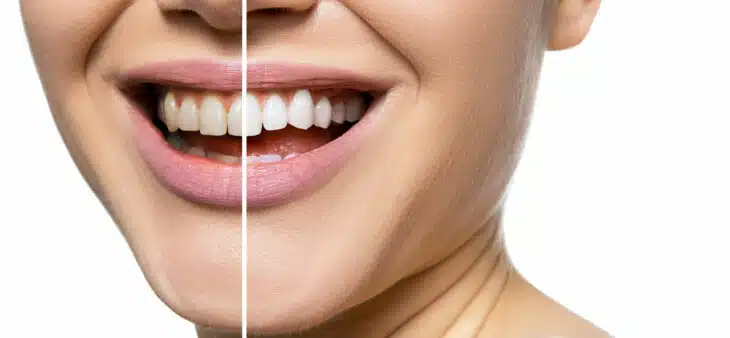
Everyone desires a beautiful white smile. Unfortunately, lifestyle choices can cause your teeth to become discolored over time. If you’re curious to learn about the causes of tooth staining and how to achieve a brighter smile, the team at A Dental Place has the answers to some of the most common questions about tooth discoloration.
Causes of Teeth Staining?
Some common causes of teeth staining include smoking, consuming dark-colored beverages like coffee, tea, or wine, and medications like antihistamines, antibiotics, beta-blockers, and heart rhythm medications.
Poor dental hygiene, aging, genetics, and oral trauma can also contribute to teeth staining.
How Can I Prevent Teeth Staining?
Maintaining good oral hygiene at home by brushing and flossing regularly and visiting your dentist for routine professional cleanings can help keep your teeth stain-free.
Quitting smoking and avoiding high-pigment foods and beverages that cause staining can be helpful. Use a straw to limit your teeth’s exposure to dark-colored drinks, or add milk to your tea and coffee. If you consume these substances, rinse your mouth with water afterward to help reduce the amount of staining.
What Foods and Drinks Stain Your Teeth?
There are several foods and beverages that are known to cause teeth staining. Some of the most common include coffee, tea, red wine, soda, and dark-colored fruit juices. Pigmented foods like berries, soy sauce, and curry sauces also contribute to teeth staining.
Acidic foods like tomatoes and citrus fruits can soften tooth enamel, allowing pigments to penetrate your tooth more easily.
Are All Types of Stains Reversible?
Not all tooth stains are completely reversible. External (extrinsic) stains caused by food, beverages, and smoking can typically be removed through professional teeth cleaning or teeth whitening treatment.
However, internal (intrinsic) stains caused by medication or trauma may be more challenging to treat. To disguise an intrinsic stain, your dentist may recommend another cosmetic solution, such as a dental veneer or crown.
Do Whitening Products Really Remove Stains?
Yes, many whitening products are effective at removing stains from teeth. These products typically contain a bleaching agent like carbamide or hydrogen peroxide, which penetrates the enamel to break down and disperse deep-seated stains.
Professional whitening treatments performed by a dentist are more effective and safer than over-the-counter at-home treatments. They contain higher concentrations of bleaching agents for faster results, and your dentist applies a protective barrier to your gums to prevent soft tissue irritation.
Is Teeth Whitening Permanent?
Teeth whitening is not permanent. Over time, teeth can become stained again due to factors like age, diet, and lifestyle choices. However, regular maintenance and touch-up treatments can help keep your smile looking bright and healthy.
Are There any Side Effects to Teeth Whitening?
Some people may experience tooth sensitivity or discomfort after teeth whitening treatments. This is typically a temporary side effect that resolves on its own. In rare cases, whitening treatments can cause gum irritation or damage to existing dental restorations.
It’s essential to speak with your dentist about any concerns you may have before undergoing a whitening treatment.
Get a Brighter Smile With Cosmetic Dentistry at A Dental Place
You can enjoy a brighter and healthier smile by maintaining good oral hygiene, avoiding staining foods and drinks, and seeking professional teeth whitening treatments. Schedule an appointment with A Dental Place to remove tooth stains and achieve a beautiful smile.
